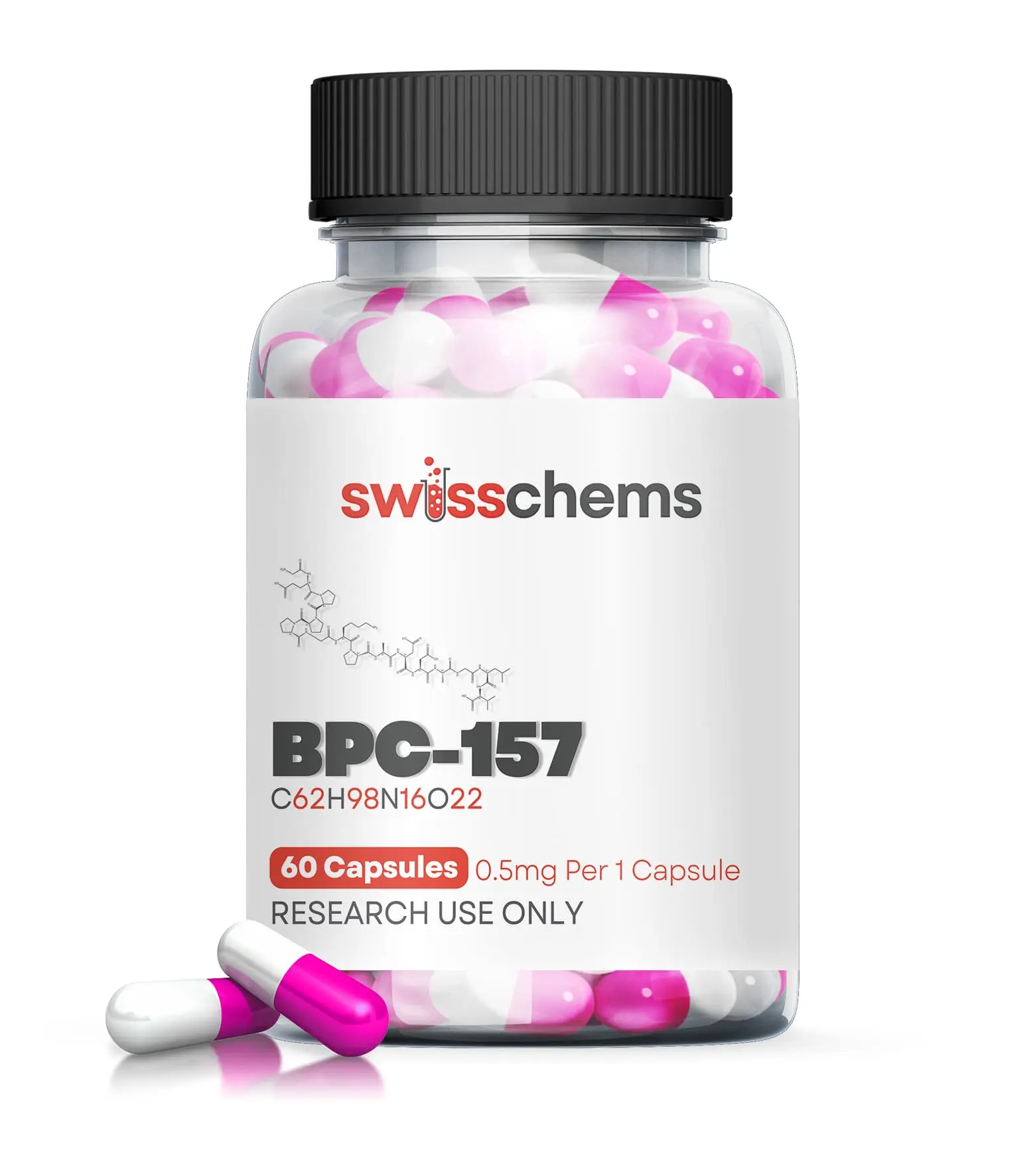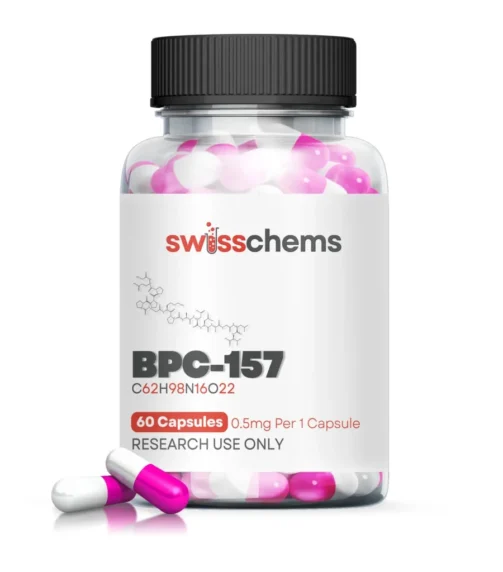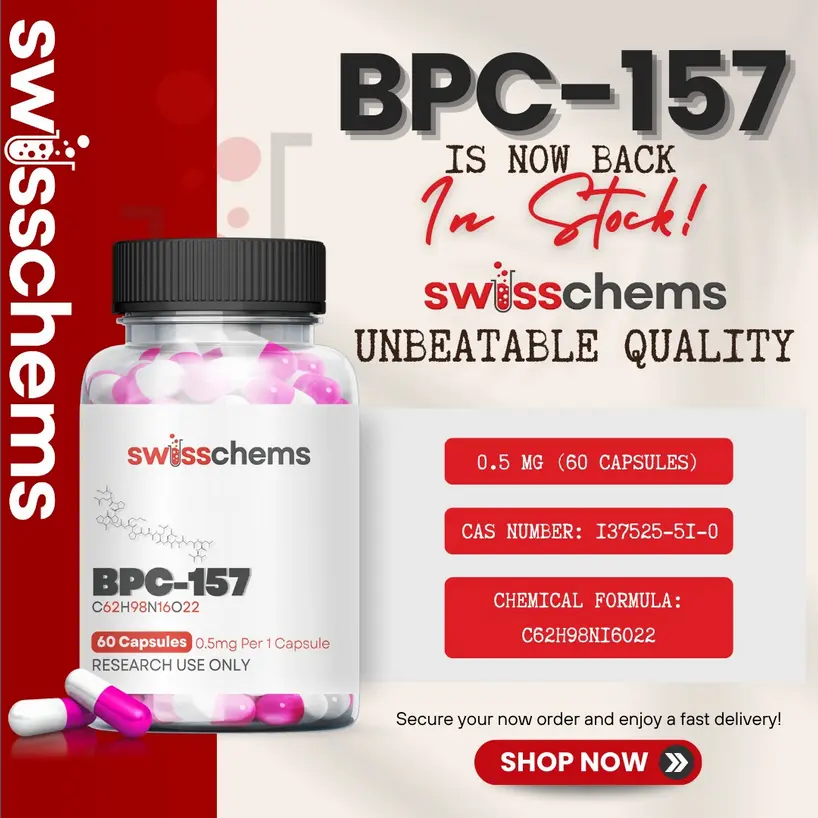Swiss Chems BPC 157 Bepecin: The Science Of Body Healing
Swiss Chems BPC 157 Bepecin: Unlocking the Regenerative Potential
In the rapidly evolving landscape of healthcare and medicine, we find ourselves on the cusp of a new era of possibilities. As innovative technologies and groundbreaking discoveries reshape the boundaries of what we thought possible, the notion of regenerative medicine has captured our imagination.
What if the human body could heal, restore, and regenerate itself in ways we’ve never seen before?
An increasing number of experts believe that BPC-157 – a peptide with remarkable regenerative and healing abilities – may hold the key to making this vision a reality. This in-depth exploration takes a deep dive into BPC-157, unveiling everything you need to know about this promising peptide that could redefine the future of medicine as we know it.
Table Of Content
What is Swiss Chems BPC 157 Bepecin?
Swiss Chems BPC 157 Bepecin is a peptide chain sourced from a natural protein found in the human stomach. It is believed to engage with vital signaling molecules such as growth factors and cytokines, orchestrating the intricate ballet of cell growth, differentiation, and inflammation regulation.
Notably, research has unveiled its capacity to trigger the synthesis of extracellular matrix proteins and encourage the formation of new blood vessels. These attributes are fundamental in the processes of tissue repair and rejuvenation.
Currently, Swiss Chems BPC 157 Bepecin is the subject of ongoing research aimed at uncovering its potential as a therapeutic agent for a diverse range of conditions, including gastrointestinal disorders, musculoskeletal injuries, and various inflammatory ailments.
Disclaimer: Swiss Chems BPC 157 Bepecin is for Research Use Only
Swiss Chems BPC-157 Bepecin Features:
- Quantity: BPC-157 30000m cg/60 capsules (0.5mg/capsule)
- Chemical Formula: C62H98N16O22
- Molecular Mass: 1419.5
- Synonyms: Body Protection Compound 15, Bepecin, L-Valine, glycyl-L-alpha-glutamyl-L-prolyl-L-prolyl-L-prolylglycyl-L-lysyl-L-prolyl-L-alanyl-L-alpha-aspartyl-L-alpha-aspartyl-L-alanylglycyl-L-leucyl-

- CAS Number: 137525-51-0
- PubChem: 994195
- Total Amount of the Active Ingredient: 300 mg (60 capsules)
- Shelf Life: 36 months
- Guarantee: HPLC Lab Tested Component. 7-Days Return Policy
- Price: $85.95
Coupon Code: SWISS69
Chapter 1: The Origins and Background of Swiss Chems BPC-157 Bepecin
To appreciate why Swiss Chems BPC 157 Bepecin is creating so much buzz in scientific circles, it’s important to understand where it came from. BPC-157 is derived from a protein found in human gastric juice, which plays a crucial role in the digestive process.
This protein, called Body Protection Compound (BPC), was first discovered by scientists in the 1990s during research on peptic ulcer disease.
One particular fragment of this BPC parent protein – a sequence of 15 amino acids – displayed remarkable protective and healing effects within the stomach.
This specific peptide fragment was isolated and termed BPC-157. Since its discovery, research on BPC-157 has exponentially grown, with over 150 studies investigating its therapeutic potential. Let’s delve deeper into what makes this peptide so unique and promising.
Chapter 2: Unveiling the Molecular Structure and Mechanisms of Swiss Chems BPC 157 Bepecin
Swiss Chems BPC 157 Bepecin is composed of a chain of 15 amino acids linked together in a specific sequence. With a molecular mass of 1419.5 and a chemical formula of C62H98N16O22, it is a relatively small peptide but one with outsized effects throughout the body.
Swiss Chems BPC 157 Bepecin exhibits an array of biological activities that have intrigued researchers across disciplines. But what are the mechanisms of action behind this peptide that lend it such therapeutic potential?
Some key mechanisms scientists have elucidated so far include:
- Stimulation of extracellular matrix protein production – BPC-157 enhances the regeneration of collagen, an essential structural protein making up connective tissues. This is key for healing injuries.
- Promotion of angiogenesis – Angiogenesis is the process of new blood vessel formation. BPC-157 stimulates angiogenesis to enhance blood supply and circulation to sites of injury.
- Anti-inflammatory effects – The peptide interacts with cytokine pathways to reduce levels of pro-inflammatory mediators. This alleviates excessive inflammation implicated in many conditions.
- Cell signaling and growth factor modulation – BPC-157 influences critical cell signaling cascades involved in cell survival, proliferation, migration and function.
- Enhanced cell-cell communication – BPC-157 facilitates communication both between cells and between cells and the extracellular matrix, coordinating repair.
These complex mechanisms underscore why BPC-157 is now being investigated for therapeutic uses spanning the gastrointestinal system, muscles and connective tissues, brain, and more. Let’s explore some of the most promising applications emerging from research on this peptide.
Coupon Code: SWISS69
Chapter 3: Gastrointestinal Healing: Restoring Function in the GI Tract
One of the areas where BPC-157’s regenerative effects were first studied is in healing various conditions affecting the gastrointestinal system.
This makes sense, given its origins in the gastric juices protecting the stomach and aiding digestion. Researchers have demonstrated BPC-157’s ability to accelerate the healing of ulcers and lesions throughout the GI tract in animal models.
In rats with induced inflammatory bowel disease, BPC-157 administration resulted in significant improvements in symptoms and recovery of intestinal structure and function.
It reduced inflammatory markers and cytokine levels while encouraging mucosal healing and growth of new blood vessels in the intestines.
In another rodent study, both gastric and colitis ulcers healed significantly faster with BPC-157 treatment compared to no treatment. Scientists also discovered BPC-157 can counteract the negative GI effects of NSAIDs when taken alongside these pain-reducing medications.
BPC-157’s therapeutic mechanisms likely activate the body’s innate defense and repair pathways while suppressing excessive inflammation from conditions like IBD. Human trials are still needed, but these early gastrointestinal healing results are extremely promising.
Chapter 4: Swiss Chems BPC 157 Bepecin-Healing Muscles and Connective Tissues
The applications of Swiss Chems BPC-157 Bepecin may extend far beyond the gastrointestinal tract. There is emerging evidence that this peptide holds tremendous potential in healing damaged musculoskeletal tissues – from muscles and tendons to ligaments and bones.
In rat studies, BPC-157 improved muscle tears by promoting the regeneration of muscle fibers while reducing scar tissue formation. Researchers also found it accelerated the healing of crushed or transected muscles.
After injury, BPC-157 appears to activate satellite cells critical for muscle repair and stimulate muscle-cell differentiation for generation of new muscle fibers.
Several trials have also indicated the peptide’s ability to counteract damage in connective tissues and improve the healing of ligament tears or detachments. Tendon-to-bone healing in injured rodents occurred faster with local BPC-157 delivery.
The peptide seems to restore the structure and function of collagen in injured tendons and ligaments while reducing scar tissue.
Researchers have also explored applications for bone healing. In both small and large bone defect models in rodents, BPC-157 improved the regeneration of bone and number of ossification sites compared to controls.
It also accelerated fracture healing. The ability to heal both soft and hard connective tissues makes BPC-157’s potential impact on sports medicine and orthopedics immense.
You May Also Like: Sight Care Eye Supplement
Chapter 5: Swiss Chems BPC 157 Bepecin-Neuroprotective Effects in the Central Nervous System
Yet another emerging and exciting application of BPC-157 is as a neuroprotective agent. There is evidence that this peptide may have therapeutic effects on damaged neurons and brain blood vessel structure while also influencing key neurotransmitters.
In mouse models, BPC-157 administration alleviated damage to brain tissue from concussive injuries. It reduced harmful inflammation, oxidative stress, and leakage of brain injury biomarkers.
BPC-157 also minimized damage to cerebellar neurons in injured rats while protecting the structure of cerebral blood vessels. In other studies, it has counteracted cognitive deficits induced in rodent models.
Interestingly, the peptide interacts with several neurotransmitter systems, including dopamine, serotonin, and acetlycholine circuits. Through influencing neurotransmitter activity, it may have implications for mood disorders and gut-brain axis health, though human studies are needed.
Protecting both the hardwired circuits and vascular supply lines to the brain could have immense impacts for recovery from traumatic brain injuries, concussions, stroke, or neurodegenerative disease.
Chapter 6: Swiss Chems BPC 157 Bepecin Wound Healing, Burns, and Anti-Aging Effects
Another area scientists are exploring with BPC-157 is its role in wound healing throughout the body. Chronic, non-healing skin wounds caused by diabetes, vascular insufficiency, or sustained pressure/friction are a major health burden.
In preclinical studies, BPC-157 showed significant acceleration of wound closure and healing compared to controls when applied topically or injected around skin wound sites.
Along with promoting new blood vessel growth and collagen formation for faster healing, BPC-157 also exhibited anti-scarring effects. This has major implications in potentially minimizing scar formation after surgery, burns, or other traumatic skin injuries.
Speaking of burns, early research indicates BPC-157 enables burn wounds to heal faster with less severe inflammation and necrosis in the injured skin. The peptide also shows promise in reversing UV damage to skin from excessive sun exposure, suggesting it may have anti-aging and protective effects from premature aging.
Chapter 7: Swiss Chems BPC 157 Bepecin-Balancing Inflammation and Alleviating Pain
Chronic inflammation and pain so commonly underlie many of today’s healthcare challenges, from autoimmune disease to arthritis to neuropathy.
As discussed, BPC-157 has shown anti-inflammatory actions across a range of preclinical disease models. Researchers believe it is able to “re-tune” and restore appropriate inflammatory responses after cellular distress or injury.
In rat arthritis studies, BPC-157 actually led to cartilage tissue regeneration while inhibiting inflammatory cytokines. And in human trials already conducted, patients with inflammatory bowel disease reported pain relief from BPC-157 therapy.
This anti-inflammatory peptide is now being studied for possible pain-mitigating benefits in conditions involving nerve damage like sciatica.
BPC-157’s anti-inflammatory effects coupled with its tissue-protective and regenerative abilities point to far-reaching therapeutic potential in alleviating some of society’s most prevalent sources of pain and disability.
Chapter 8: Swiss Chems BPC 157 Bepecin-Availability, Legality and Dosing Considerations
Unlike many supplements with outsized health claims not supported by science, BPC-157 is emerging from rigorous preclinical research displaying remarkable healing results across bodily systems.
However, human clinical trials are still early. While some countries allow it, BPC-157 cannot yet be marketed as a drug or supplement in the United States.
But it is legally available for purchase for research purposes only, not human consumption. This allows scientists and healthcare professionals to continue investigating applications.
One reliable source is Swiss Chems. Their BPC-157 Peptide product provides high quality BPC-157 acetate in powder form for versatile administration and dosing.
Always consult a doctor before using peptides like BPC-157. But common dosing recommendations are around 5-10 mg per day. For maximum absorption, take it on an empty stomach by subcutaneous injection, topically, or orally dissolving the powder under the tongue.
When prescribed and monitored by a physician, user reports and emerging medical evidence suggest BPC-157 dosing is likely safe and well-tolerated.
You May Also Like: Metanail Serum Pro Healthy Nails
Chapter 9: Swiss Chems BPC 157 Bepecin-The Future Potential of BPC-157
As this deep dive has explored, BPC-157 represents an exciting new chapter for regenerative medicine and therapeutic peptides. With the ability to heal muscle, tendons, skin, neurons, blood vessels, and GI tissues, its future implications span from professional sports to postoperative recovery to hard-to-treat diseases. By activating the body’s dormant self-healing pathways, BPC-157 may profoundly accelerate patient recovery and centers.
While larger scale human trials are still needed, the overwhelmingly positive and accelerated healing results seen in preclinical models continue generating enormous interest and research investment into BPC-157.
It’s not a stretch to say we may be witnessing the emergence of a hugely beneficial new peptide that transforms how we are able to treat injuries, autoimmunity, neurological conditions, gastrointestinal disorders, and the entire landscape of disease recovery.
Much work remains to fully validate and expand upon early discoveries with BPC-157. But its future is undeniably bright and filled with therapeutic promise. BPC-157’s unique power to harness our self-healing potential may soon usher in a new era of medicine centered on the body’s innate regenerative capacities.
Swiss Chems BPC 157 Bepecin: Conclusion
In the world of regenerative medicine, where innovation and discovery are driving the boundaries of what’s possible, Swiss Chems’ BPC-157 Bepecin, often referred to as Bepecin, emerges as a beacon of hope.
Throughout this comprehensive exploration, we’ve delved deep into the origins, properties, and potential therapeutic applications of this remarkable peptide.
Swiss Chems BPC-157 Bepecin is no ordinary compound; it’s a peptide chain intricately woven into the very fabric of our biology, derived from a natural protein in the human stomach. Its role in orchestrating the intricate symphony of growth factors and cytokines, which guide cell growth, differentiation, and inflammation, is awe-inspiring.
But the true magic lies in its ability to stimulate the production of extracellular matrix proteins and spur the formation of new blood vessels. These capabilities open up a world of possibilities for tissue repair and regeneration.
As we’ve explored, Swiss Chems BPC-157 Bepecin is not a one-trick pony; it holds promise in addressing a spectrum of medical conditions.
From gastrointestinal disorders where it could restore digestive health to musculoskeletal injuries where it could expedite recovery and reduce downtime, and even in the battle against chronic inflammation, BPC-157 is stepping up as a potential game-changer.
Moreover, Swiss Chems BPC 157 Bepecin offers a convenient way to access this regenerative powerhouse with a product that contains 30,000 mcg of BPC-157, ensuring accessibility to those eager to explore its benefits. With a shelf life of 36 months, it’s a reliable option for those seeking long-term solutions.
In closing, BPC-157 is not just another substance; it represents the ever-evolving landscape of medical science, a frontier where natural compounds and modern innovation merge to potentially transform lives.
As we continue to unravel the mysteries of this remarkable peptide, its future looks increasingly promising, offering hope and healing to those in need.
Whether you’re an athlete looking to recover faster or an individual seeking relief from chronic conditions, BPC-157, and Swiss Chems’ role in making it accessible, underscores the boundless potential of regenerative medicine. It’s a testament to the power of science and human ingenuity working in harmony to shape a healthier, more vibrant future.

Coupon Code: SWISS69


